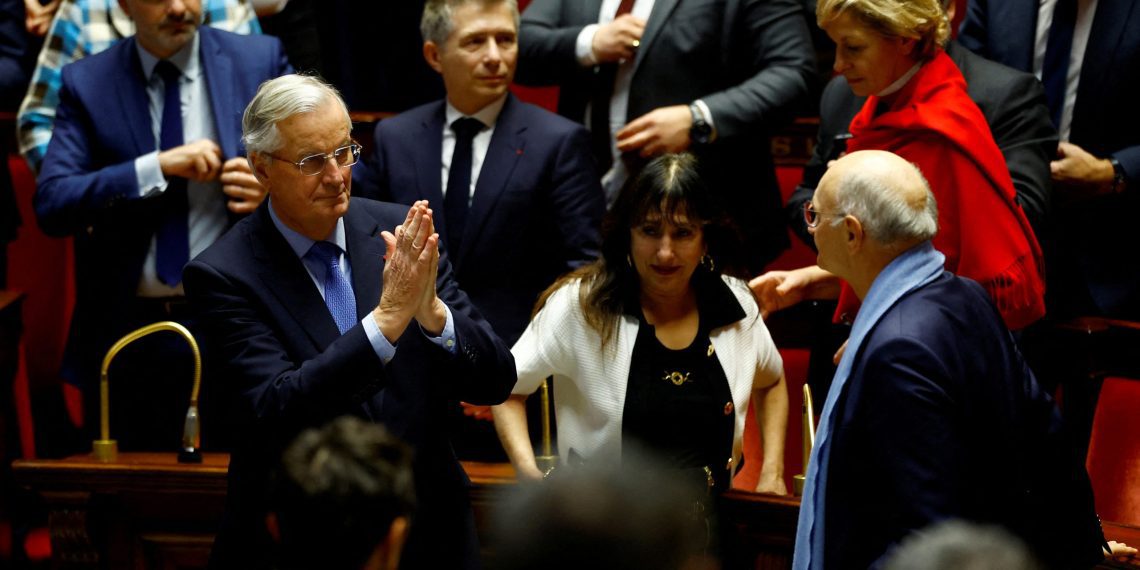In an unprecedented political upheaval, the French government led by Prime Minister Michel Barnier fell on Wednesday, marking the shortest tenure of any administration in the Fifth Republic. The collapse came just days before its 100-day milestone, following a decisive no-confidence vote backed by both the leftist New Popular Front coalition and the far-right National Union led by Marine Le Pen.
A government on borrowed time
The no-confidence motion, spearheaded by the New Popular Front, passed with 331 votes out of 574, surpassing the 288-vote threshold required to topple the government. Le Pen’s National Union had already pledged support for the leftist motion, sealing Barnier’s fate even before the debate began. The motion received an additional 32 votes from independents and other opposition members, underscoring widespread discontent with the administration.
Barnier’s fall was largely tied to his contentious use of Article 49.3 of the French Constitution earlier this week to bypass parliament and pass the government’s Social Security budget. His decision followed fraught negotiations with Le Pen’s party, which demanded concessions such as cutting taxes on electricity, reducing medical aid for undocumented immigrants, and preserving reimbursements for certain medications. However, Barnier’s refusal to delay pension hikes—a key National Union demand—shattered any chance of securing their support.
A plea for responsibility ignored
In a defiant speech before the vote, Barnier acknowledged the imperfections of his budget, citing the limited time he had to draft it. “I had only 15 days to prepare it, and I recognize it isn’t perfect,” he said. He called on lawmakers to act responsibly but ultimately failed to sway them. The left and the far-right, united in opposition, took aim at his leadership and policies, forcing his resignation.
Barnier exited to a standing ovation from loyal deputies, but his fall deepens a political crisis that has gripped France since President Emmanuel Macron dissolved the National Assembly in June following the far-right’s shocking victory in the European elections.
Macron’s next steps amid chaos
With France’s political stability hanging by a thread, President Macron is racing to name a new prime minister by Saturday, according to Reuters. Potential successors include former Prime Minister Bernard Cazeneuve, ex-Labor Minister Xavier Bertrand, and current Armed Forces Minister Sébastien Lecornu. Macron is set to address the nation on Thursday night, where he is expected to outline his vision for resolving the crisis.
Despite calls from opposition figures for Macron’s resignation, the president has dismissed the possibility, signaling his determination to steer France through this turbulent period.
Economic implications: markets remain calm—for now
While the political turmoil raises questions about France’s governance, financial markets have remained relatively steady. The Paris Stock Exchange rose for the fifth consecutive session, and yields on 10-year French bonds dropped to around 2.9%. However, the broader implications of prolonged instability could strain France’s ability to borrow at favorable rates, particularly as its bond yields hover closer to those of Greece than its peers like Spain and Portugal.
Barnier had warned of “serious market turbulence” tied to the political impasse, emphasizing the precarious state of French finances. His departure leaves unresolved concerns about France’s ability to manage its mounting fiscal challenges amidst rising interest rates.
The shortest-lived government in French history
Barnier’s administration was doomed from the start, navigating treacherous waters as a minority government with limited support. His decision to invoke Article 49.3 to push through critical legislation became a flashpoint, triggering the very no-confidence motions that brought his government down.
Political analyst David Bailey of the Birmingham Business School noted, “This collapse reflects deeper fractures within the French political system, where polarized forces on the left and right have made governance nearly impossible.”
What’s next for France?
As Macron scrambles to stabilize his administration, the stakes are high. The second-largest economy in the European Union faces not just political but economic uncertainty, with confidence in its leadership waning. The clock is ticking for Macron to form a new government capable of navigating the volatile political landscape and restoring order.
For now, France remains mired in a political crisis that has upended its leadership and cast a shadow over its future. Whether Macron can weather this storm remains to be seen.









